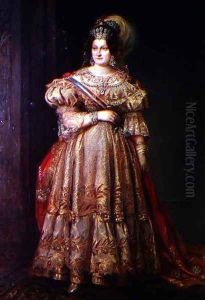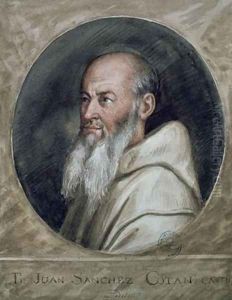Valentin Carderera y Solano Paintings
Valentin Carderera y Solano was a prominent figure in the 19th-century Spanish art scene, both as an artist and an art historian. Born on October 8, 1796, in Huesca, Spain, his contributions spanned several decades, during which he played a crucial role in the preservation and documentation of Spanish cultural heritage. Carderera was educated in Zaragoza and Madrid, where he developed a keen interest in art, eventually dedicating his life to its study and promotion.
Initially trained as a painter, Carderera's interests and work soon encompassed a broader spectrum, including the collection of Spanish old masters' works, drawings, and prints. He traveled extensively throughout Spain, documenting its art and monuments, and became an early advocate for the preservation of Spain's historical and cultural legacy. He was a contemporary of the Romantic movement, and his work was influenced by the Romantic interest in national identity and heritage.
Beyond his artistic endeavors, Carderera was a founding member of several cultural institutions, including the Royal Academy of Fine Arts of San Fernando, where he also served as a professor and librarian. His scholarly work includes numerous publications on Spanish art and artists, which remain valuable resources for the study of Spanish art history. Among his most notable works is the 'Iconografía Española,' a monumental collection of portraits of notable Spanish figures, which showcases his meticulous research and dedication to the preservation of Spanish cultural history.
Valentin Carderera y Solano passed away on June 3, 1880, in Madrid, leaving behind a legacy that continues to influence the study and appreciation of Spanish art. His efforts in the documentation and preservation of Spain's cultural heritage have made him a respected figure in the annals of art history, celebrated for his contributions to the understanding and appreciation of Spanish art and culture.

